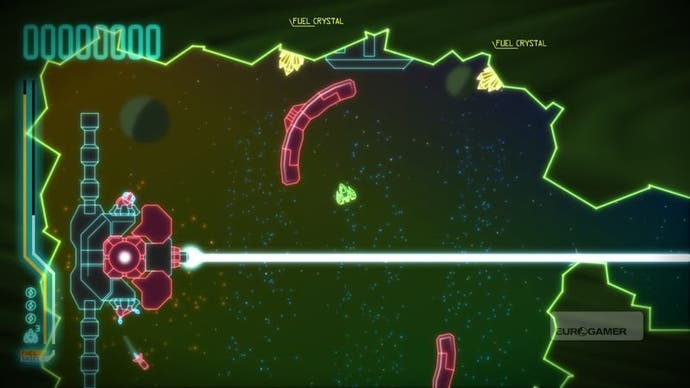Gravity Crash
You get its thrust.
Thrust-style games are all about pure ship control, however, and here Gravity Crash doesn't disappoint, offering two vastly different but pretty rewarding set-ups. A twin-stick scheme in the modern idiom - move with the left, shoot in any direction with the right - is highly playable but still provides plenty of challenge when fighting gravity in tight sections. The classic controls - rotate left and right, thrust, and shoot the way your ship is facing - are a stern test, but not an unfair one, although you suspect that some levels' enemy placement wasn't designed with this in mind, so hard can it be to keep your enemies in the firing line and your ship off the rocks at the same time. The two control schemes effectively make for two difficulty levels, almost two different games.
You can also opt for manual or automatic shields, the former having the advantage of recharging over time, but needing quick reactions to avoid constant death. The latter need to be recharged by shooting large crystals and collecting the shards left behind, which also refill the fuel gauge. Balancing exploration against straying too far from where you know crystals, or developing a fuel-efficient flying style, are the sort of old-school mechanics, rarely seen these days, which it's fun to reminded of.

That's not so true of the campaign mode's structure, which is soft enough to grant infinite continues with the only penalty being to reset your score to zero, but harsh enough to offer no halfway house - opt out of a continue, and all your progress is wiped clean. The difference between rejecting a continue (back to square one) and simply quitting the game (current progress is saved) isn't intuitive or explained anywhere, leading to inevitable tears before bedtime. Worse, the game's risk-reward balance is thrown out of whack, as there's no real incentive to put in a good performance on your first run - the score will inevitably be wiped clean - whereas trying to run the entire thing in a handful of lives is an extreme endurance test. Better to retreat into Planet mode, where each level unlocked in Campaign can be played and perfected independently.
Gravity Crash is fleshed out with a level editor, which is simple enough to use, and we wouldn't be surprised if the community managed to come up with some more imaginative uses of its limited rules and bits of furniture than Just Add Water has. There are also three awful split-screen multiplayer modes, deathmatch, race and scavenge - all of them hampered by the tight display size, clumsy interactions and afterthought map design.
Although they're more different games that at first appears, Gravity Crash suffers terribly from the comparison with the slick PixelJunk Shooter. They may be trying to do different things, but the charm, ambition, imagination and fine execution of Q-Games' effort - or of something like Geometry Wars - shows how to make retro gaming relevant in a way Gravity Crash can't muster. It's just about worthwhile as a chance to test yourself against some long-forgotten mechanics, but you can't shake the feeling that Just Add Water is just joining the dots.

